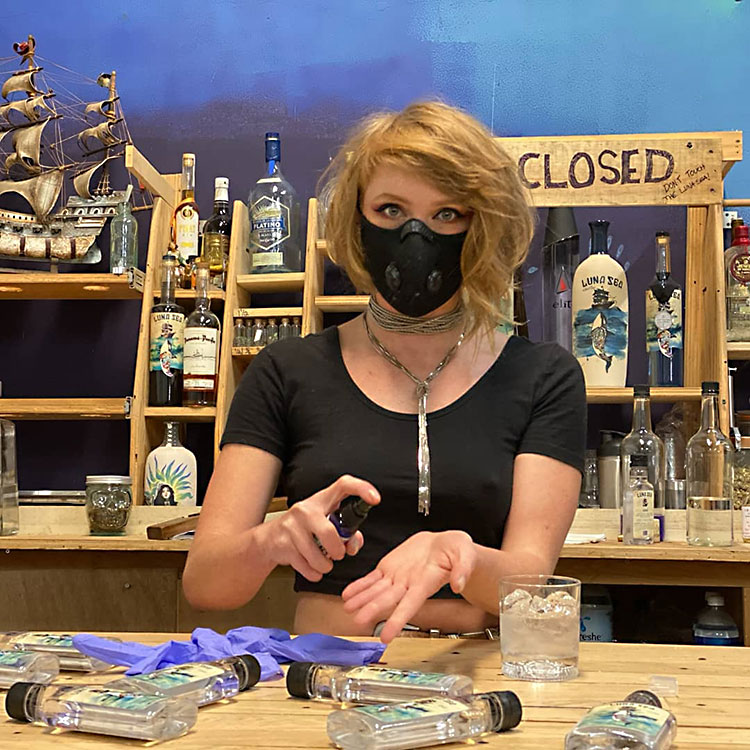Help is Close By: Drive-Thru Food, Grey Bears, Alliance for Health and More
By Jondi Gumz
All public schools in Santa Cruz County will remain closed through May 5, to reduce the spread of COVID-19 “to the maximum extent possible,” according to a March 27 letter to families from all of the school superintendents.
 They concluded, with Santa Cruz County’s public health officer, that “it is appropriate and necessary to extend the period of school closures,” describing the situation as “this unprecedented crisis.”
They concluded, with Santa Cruz County’s public health officer, that “it is appropriate and necessary to extend the period of school closures,” describing the situation as “this unprecedented crisis.”
Nutrition services will continue to be provided. The Soquel Union Elementary District is providing lunches for any child 18 or younger from 10 a.m.-noon every day in the parking lots of New Brighton Middle School, Soquel Elementary School, and the Emerald Bay Apartments, Superintendent Scott Turnbull said.
During spring break, schools will not offer food or distance learning. In the Pajaro Valley Unified School District, spring break will take place March 31 through April 3. All other districts will have spring break April 6-10.
The letter acknowledged the stress for parents who are being asked to provide an environment conducive to learning at home while they manage unanticipated consequences of the COVID-19 crisis. To help, a webpage at sccoe.link/wellness offers resources.
Other helpful resources are at: sccoe.link/community_resources and sites.google.com/pvusd.net/pvusdparentideas/home
Efforts are underway to offer online support and networking experiences for families to lean on each other in these challenging times.
Second Harvest Offers Drive-Thru Distribution
Second Harvest Food Bank will offer its first “drive-through” community food distribution 9 a.m. to 1 p.m. Friday, March 27, at the Santa Cruz County Fairgrounds in Watsonville.
Next week, Second Harvest plans another “drive-through distribution” at the site of the Goodwill flea market (formerly a drive-in) at 2260 Soquel Drive, Santa Cruz.
Residents of Santa Cruz County can get a bag of pantry items and a bag of produce, which is plenty for a family, and Second Harvest asks anyone who gotten food from Second Harvest this week to let others get their share.
Community members are asked to not arrive before 9 a.m to allow staff to set up the distribution. To learn more, call the Second Harvest Community Food Hotline at (831) 662-0991 or check online at www.thefoodbank.org.
The food distribution in Watsonville is for residents of Santa Cruz County. People in need in San Benito county can call (831) 637-0340 and those in Monterey County can call (831) 758-1523.
Aptosia
Aptos resident Keith Redfield, who’s on the Aptosia Facebook page, came up with the idea to help connect people in need with people who can help during the COVID-19 coronavirus outbreak and the “shelter in place” order.
He connected with Daniel Drysdale from Santa Cruz Tenant Power and their MutualAid program.
Members of that group are now “providing the bulk of our delivery capability,” Redfield said.
A form on Aptosia Freshdesk has been created for people to request help and to volunteer help. Once filled in, a click crates a help ticket that triggers a response by the organizers.
This form is sponsored and coordinated by the Santa Cruz Chapter of the Democratic Socialists of America, which is the local chapter of the largest socialist organization in the country.
Those without online access can call Santa Cruz Tenant Power at 831-222-0304 or email [email protected].
A GoFund Me drive is active at: https://www.gofundme.com/f/mutual-aid-fund-for-santa-cruz-covid19-impacts
So far, Jean Anderson provided a list of organizations with information and assistance, such as Grey Bears and Meals on Wheels and the Sheriff’s Office You Are Not Alone program to call homebound elders. Details: http://scsheriff.com/Home/CommunityServicesandPrograms/YouAreNotAlone(YANA).aspx
Another post lists Aptos area restaurants offering takeout food, such as Publick House, Pizza One in Seacliff and Tacos Moreno on 41st Avenue I Capitola. There’s also a checklist for pet owners on how to arrange for pet care in case they have to go the hospital.
For people who live outside Aptos, the NextDoor.com neighborhood network accepts free postings to residents to request and offer assistance.
Temple Beth El
Temple Beth El in Aptos, which serves about 540 families, suspended all services, classes and meetings due to the “shelter in place” order. But people are staying connected thanks to old and new technology.
Rabbi Paula Marcus plans a “lunch and learn” for members via phone or video.
The Rock Shabbat service has moved online.
Instead of an in-person community Seder to commemorate Passover, which begins April 8 and concludes April 16, the temple staff plans to offer an innovative online Seder experience. Details will be announced.
“We have Zoom events, phone, and people helping each other,” said Richard Litvak, who retired as rabbi four years ago.
The Santa Cruz Jewish Film Festival is postponed, and given the uncertainty over when normalcy will return, a new date has not been announced.
Alliance for Health

Lauren Harvengt dons a mask at Luna Sea Spirits, which has been making hand sanitizer in face of the national shortage.
Central California Alliance for Health, headquartered in Scotts Valley, has closed the public areas and service counters at the Scotts Valley, Salinas and Merced offices to reduce the risk of exposure to the coronavirus COVID-19.
Members of the health plan who need assistance can call 800-700-3874.
“During this public health crisis, the Alliance remains steadfastly committed to ensuring the more than 320,000 members in its service area continue to have access to needed health care services,” said Stephanie Sonnenshine, chief executive officer of the nonprofit managed health care plan for Medi-Cal in Santa Cruz, Monterey and Merced counties.
The Alliance asks members to call their doctor if they have been in contact with someone known to have COVID-19; or are experiencing symptoms such as shortness of breath or difficulty breathing, fever and cough. If they can’t reach their doctor, they can call the Alliance’s Nurse Advice Line, 844-971-8907, and a registered nurse will help them decide what to do. The advice line is free to members and open 24 hours a day, seven days a week. For Hearing or Speech Assistance call (TTY: Dial 7-1-1).
Member guidance is posted online at https://www.ccah-alliance.org/pdfs/MEM_COVID_member-talking-points-F-ENG.pdf
What is Needed
Aptos resident Mark Johannessen, a member of the Santa Cruz County Seniors Commission, said he hears people worried about COVID-19 exposure asking how to protect themselves when the mail carrier delivers, when a package arrives, when a food delivery shows up.
On February 27, the US Food and Drug Administration issued a statement saying, “FDA is not aware of any reports at this time of human illnesses that suggest COVID-19 can be transmitted by food or food packaging.
However, it is always important to follow good hygiene practices (i.e., wash hands and surfaces often, separate raw meat from other foods, cook to the right temperature, and refrigerate foods promptly) when handling or preparing foods.”
The California Department of Public Health posted a similar guidance on its website about on the food supply chain, saying the agency is not aware of any reports at this time of human illnesses that suggest COVID-19 can be transmitted by food or food packaging.
CDPH reiterates the importance of good hygiene and encourages practices and behaviors that can help prevent food handlers from spreading contaminants including viruses to food. See: https://www.cdph.ca.gov/Programs/CID/DCDC/CDPH%20Document%20Library/COVID-19/Coronavirus%20Disease%202019%20and%20Food%20Industry.pdf
On March 20, the National Institutes of Health reported on a study published in the New England Journal of Medicine that found the virus causing COVID-19 was detectable in aerosols for up to three hours, up to four hours on copper, up to 24 hours on cardboard and up to two to three days on plastic and stainless steel. That prompted more precautions from health officials to clean surfaces and wash hands.
On March 13, Dr. Stephen Parodi of Kaiser Permanente shared on JAMAnetwork.com plans for droplet precautions for health care workers and care via telephone or video conferencing.
Seniors Council
Clay Kempf, executive director of the countywide Seniors Council, said volunteers are definitely needed, suggesting Grey Bears, the Santa Cruz County Volunteer Center, and Meals on Wheels of Santa Cruz County.
All meal sites in Santa Cruz County for seniors, including the Live Oak Senior Center, are closed due to the new social distancing rules to slow spread of the coronavirus COVID-19.
Kempf said Meals on Wheels, a part of the nonprofit Community Bridges,
is working to make sure people wanting a home-delivered meal in lieu of the hot lunch at a center, get one but he noted an increase in loneliness for those who enjoyed the communal sites.
“We don’t have any statistics to report yet, nor cost estimates for the new needs, Kempf said. “Anecdotally, the ability to purchase basic food and supplies is a challenge, for several reasons, especially the impact of people of all ages stockpiling things like canned food, toilet paper, pharmaceutical supplies, etc. Adding to the challenge of shortages is the often aggressive behavior of shoppers, making it more difficult for frail seniors or people with disabilities to navigate markets, even when supplies are available. Efforts are being made to work with pharmacies and grocers to provide home delivery of critical goods.”
He is reviewing the results of a new senior needs assessment and expects to issue a report soon.
The Area Agency on Aging reduced hours for employees and staff at Del Mar Caregiver Resource Center are working from home, using phone and videoconferencing. Staff at the Ombudsman/Advocacy Inc. are working remotely, taking calls about allegations of abuse of elders in long-term care facilities with some experienced ombudsmen entering facilities in protective gear to meet with residents.
Grey Bears
Grey Bears, a countywide nonprofit at 2710 Chanticleer Ave., Santa Cruz, closed its thrift store but recycling service is open — and so does its “brown bag” delivery of fresh produce and groceries to 3,800 people weekly.
“What we need now are financial donations, donations of cleaning supplies and sanitizers (we’re doing OK right now but can always use more) and volunteers (under age 65, healthy, non-exposure to anyone with COVID-19),” said Tim Brattan, Grey Bears’ executive director.
“It’s really an absolute shame that we can’t have our regular crew here, who are pretty much all over 65,” he said in a March 19 email. “Today was rough. They and we are so sad that they have to stay at home.”
To volunteer email [email protected] or call 831-479-1055 ext. 241.
Some recent donors include Shadowbrook Restaurant in Capitola (which donated all of their cooler food), Lillian’s Italian Kitchen (which sent 10 meals to seniors and will again each day to a different group referred by Grey Bears), and garden gleaners who brought in lemons.
Deven Volk, founder of Luna Sea Spirits, a Santa Cruz startup, sent over 1,000 bottles of hand sanitizer to help Grey Bears.
The award-winning vodka company went into making hand sanitizer “the moment we heard there was a shortage,” Luna Sea spokeswoman Trinity Santacruz said. “We are grateful that we have access to ethanol to create a vital product and are able to employ people during this pandemic.”
The product is made with 80% ethyl alcohol, aloe gel handmade by Luna Sea, and essential oil.
The price at the warehouse on Ingalls Street in Santa Cruz noon to 5 p.m. daily is: 65ml spray bottle, $5 each; 200ml refill/pocket bottle, $10. Because of the spray bottle shortage, people can get a refill of their own personal bottle for pennies per milliliter.
•••
Orders can be made by messaging Luna Sea Vodka on Facebook, Instagram, or email. Shipping costs ranges from $8-$15.



